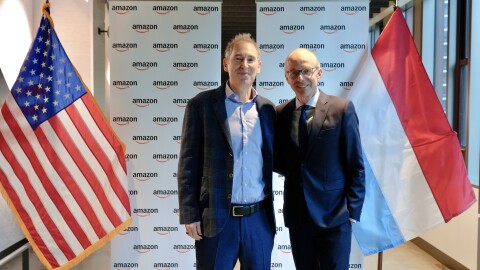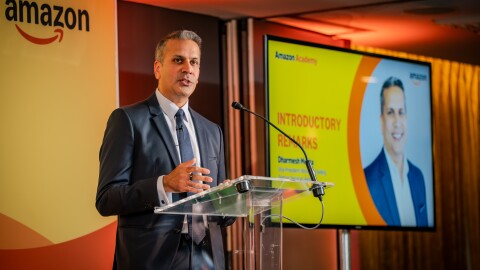A mid geopolitical tensions and pressure to deliver on EU competitiveness, the Danish Government takes the helm of the EU at a sensitive and critical time. Under the slogan of ‘A strong Europe in a changing world’, the Danish government has prioritised a ‘secure Europe’ and a ‘competitive and green Europe’ for its presidency, with competitiveness and the reduction of burdens on SMEs recurring themes throughout its programme . The EU focus on competitiveness and the Single Market, outlined in the European Commission's competitiveness agenda and its Single Market Strategy, provide an essential roadmap for the Danish Government.
We are proud to have an Amazon Web Services presence in Denmark and to have collaborations with Danish companies, such as shipping company Maersk, where we have partnered on the ECO Delivery initiative to reduce greenhouse gas emissions through certified low-emission fuels for ocean shipping. We're making progress toward our shared commitment to achieve net-zero carbon emissions by 2040 as co-signatories of The Climate Pledge.
As a company deeply invested in Europe's economic landscape, we recognise the momentum needed over the next six months. Since establishing our first European presence in Germany in 1998 we have witnessed the evolution of the EU's business environment firsthand. Our investments across the EU have exceeded €225 billion since 2010, including over €38 billion in 2024 alone. The real impact of competitiveness policies becomes evident when examining the experiences of small and medium sized businesses. This includes the 127,000 EU-based sellers who sell on Amazon, who exported €15 billion across the Single Market last year. Their experience highlights both the transformative potential of a fully functioning Single Market, as well as the real-world cost of the stubborn barriers that continue to impede cross-border growth.
Practical priorities: From strategy to implementation
The Danish Government plans to “focus on regulatory simplification and better regulation in the EU to ease daily operations for businesses and other stakeholders”. Two areas where the Danes can turn these aspirations into a meaningful upside for EU SMEs - and therefore EU citizens - are:
- The simplification of fragmented extended producer responsibility (EPR) schemes presents an opportunity to simultaneously ease regulatory compliance burdens while advancing circular economy objectives. Currently, businesses exporting across the EU must navigate a labyrinth of different national requirements for producer responsibility, creating unnecessary administrative hurdle and costs. This can, and must, be made simpler and would help small businesses particularly.
- The progression toward digital labelling represents a modern approach to consumer information that reflects the realities of today's marketplace. The potential to move away from physical labels, requiring translation into multiple languages, toward Digital Product Passports could dramatically reduce compliance costs, while improving the quality and accessibility of product information.
Eva Rytter Sunesen, Partner at Implement Consulting states that "Danish SMEs and policymakers are uniquely positioned to champion Single Market reforms through their practical business approach. This creates a distinct opportunity for the Danish Presidency to lead efforts in securing a more competitive and integrated Europe. By prioritising the harmonisation of regulations, cutting compliance costs, and standardising product labelling across the Single Market, the presidency can unlock the full potential of both Danish and EU SMEs, ultimately restoring Europe's competitiveness and economic growth."
Conclusion: The path forward through partnership
As Denmark embarks on its EU Presidency, the path toward enhanced competitiveness requires more than policy documents - continued dialogue between policymakers and industry representatives is essential to ensure that regulatory initiatives genuinely achieve harmonisation and simplification. Streamlining extended producer responsibility schemes and advancing digital labelling solutions offer tangible ways to reduce business barriers while furthering both economic and sustainability goals.
Europe's competitiveness agenda can be accelerated through pragmatic policy that strengthens the foundations for innovative, sustainable, and competitive European businesses of all sizes. Denmark's leadership in this chapter of European policymaking will be an important milestone in determining whether the promise of a truly unified, competitive European market can finally be realised.










